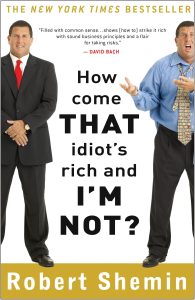When it comes to one’s largest lifetime expense and investment, buying a home is at the top of the list for many. In today’s world, where real estate prices are soaring and rental rates are rising quickly, buying from retail markets can prove daunting. However, Shemin suggests there are more affordable options for purchasing a home: Leasing with an option to buy or buying wholesale instead of retail.
Leasing with an option to buy allows individuals to get their foot in the door without taking out a large loan from the bank, as they pay rent until they are able to amass enough savings for a down payment on the property. Buying wholesale also enables buyers to purchase properties at prices below market value and resell them later on for larger profits, thus creating the potential for wealth over time.
“Get the best rent possible with an option to buy and every month, a percentage of what you pay goes to the credit towards the purchase price. Lock in the low rent and lock in the option to buy below market,” said Shemin. “Lease with an option to buy is a unique strategy and you may be able to live rent-free because you can Airbnb it.”
“The lease option enables you to participate in the market going up, you have the option price to buy it, and you’re not throwing your rent away. You don’t have an expensive mortgage and you’re not paying for the taxes and insurance, you have a lease and an option to buy. There are a lot of advantages and very few disadvantages, especially in an expensive market,” he continued.
Robert Explains the Trend of Tiny Homes:
A tiny home, also referred to as a “micro home,” can be one of the most cost-effective and eco-friendly real estate investments one can make. Tiny homes are great for the environment because they require much less energy to operate than traditional, bigger homes, while still providing comfortable living spaces. Not only do they help reduce your overall environmental impact, but tiny homes are also an incredibly useful tool for saving money on real estate investments.
The cost of purchasing a tiny home is much lower than traditional real estate investment options like buying a full-sized house or apartment building. This makes them an ideal choice for those looking to invest their money without breaking the bank, especially for high-expense real estate markets in big cities such as California.
Shemin recommends finding alternative pieces of land, renting a spot, and rolling the tiny home out there or placing it there permanently. He also noted that there are different financing options for these types of homes.
“There are all types of tiny homes, but the average price range can be anywhere from $30,000 to $150,000. This is much more affordable than the average house price of almost $400,000 in the United States now,” he said.
“For some people, whether it’s a young person or a single person, it can make sense. A tiny home can be the answer to help save them money,” said Shemin.
Container Homes
Another alternative that potential homeowners can consider is container homes. A container home is a type of property that is often made of upcycled shipping containers, which can be modified to provide an unconventional living space. Container homes are typically much more affordable than traditional brick-and-mortar properties, making them ideal for those looking to save money while investing in real estate.
Not only do these homes offer great value in terms of cost and durability, but they come in various sizes and offer environmentally sound qualities. Container homes additionally allow increased flexibility for building times, as the speed of the build can be quicker than conventional home layouts. This will save investors not only money, but time.
Retail and Wholesale
There are two markets people should learn about in the real estate industry: The retail market and the wholesale market. Generally speaking, in the retail market, investors purchase properties with the intention of reselling them to an end user at full price. Conversely, in the wholesale market, investors purchase properties at discounted prices from motivated sellers and then repackage them as investments for other buyers.
In short, the retail market encompasses all of the transactions that occur at full price, whereas the wholesale market consists of transactions below market price. While individuals have often been trained to buy in the retail market, many are unaware that the wholesale market can offer prices up to 40 percent below that of the retail market.
This presents a unique opportunity for savvy investors who are looking to make a profit by buying in the wholesale market and then selling in the retail market. Shemin touches on the several ways that individuals can explore wholesale properties:
Going Direct
Given the current economic conditions, investors should consider pursuing opportunities for purchasing properties below market value from landlords who have held their assets for an extended period of time. Oftentimes, these landlords are more willing to part with their property at a lower cost than those who have recently acquired them, making them attractive targets for investors seeking to maximize their return.
Shemin said, “Often times I call four to 20 rent ads a day to find a highly motivated, tired landlord.”
Finding Highly Motivated Sellers
Investors should focus on identifying highly motivated real estate sellers in order to maximize their return on investment. Such landlords are typically enticed to offload their property due to a variety of factors, such as the need for liquidity, financial distress or an inheritance situation. It is therefore essential for investors to be aware of the potential motivations that can impel a landlord to become a seller. According to Shemin, key motivations include:
- Landlords facing pre-forclosure or imminent foreclosure
- Properties requiring extensive amounts of work or updates
- Landlords calling for rental vacancy listing advertisements
- Landlords facing inheritance situations such as divorce
- Estate sales and probate circumstances
Investors can additionally locate highly motivated sellers by accessing public records of those who have outstanding payments on their property taxes before the homes reach auctions. Moreover, these transactions result in a mutually beneficial outcome in which the seller has the chance to avoid further distress and liquidate quickly while investors can capitalize on discounts, acquiring property significantly below the market price.
Finding Wholesalers
Investors can benefit from connecting with wholesalers in order to purchase properties at below-market prices. Wholesalers are typically real estate professionals who specialize in locating and marketing undervalued assets, placing highly motivated sellers under contracts while allowing other buyers to capitalize on favorable discounts and generate a profit. Investors can actively pursue relationships with wholesalers in their area by attending industry events, networking with real estate professionals, and researching online sources for leads.
Shemin said that although wholesalers may initially mark up the prices of these properties, investors have the opportunity to negotiate and secure even better deals further below the market price.
Alternative Financing Options
According to Shemin, real estate investors looking to finance a property without taking the traditional bank loan route should consider alternative methods such as money partners and owner-seller financing.
Money partners are individuals who invest money in real estate projects, often taking an ownership interest or a share in the profits. Partners may also include parents or friends of the investor. This method of financing is attractive to investors because it allows them to start a project relatively quickly, with minimal upfront costs.
Owner-seller financing involves an arrangement between the buyer and seller that allows the buyer to pay off their portion of the purchase price over time as opposed to a lump sum payment at closing. Many sellers will provide buyers with loans so they can garner interest on these payments, making it a mutually beneficial agreement for both parties. Shemin recommends locating seller-financing homes because the seller oftentimes finances the purchase for around 10 to 20 years without requiring the buyer to make big deposits.
Shemin said additional options for financing without bank loans also include government programs, agriculture, Small Business Administration (SBA) loans and alternative funding.
Investing 401(k)s, the Stock Market and Beyond
Most have an investment plan, a 401k, 43d, or a money manager, and people have no idea what they are investing in. A lot of these people take big commissions. Robert recommends looking at the real rate of return and not the average return. “If inflation is 6, 7, or 8%, and you are making 3,4,5, or 6%, then you are losing money every month. Educate yourself. Know what you are doing, don’t just hand it over to someone,” said Robert. Sixty percent of the wealthy people in the world invest in real estate and or buy into businesses. Most people lose money. Become an expert in one area and really understand what area you are investing in. Diversify and when you make a big gain, be conservative.
Pick one or two areas and go narrow and deep. (whenever youre buying a product or service use outside experts to get their opinions, not just the opinions of the people selling you the deal, verify all aspects of the deal) Understand the business, get a mentor, and don’t invest until you understand what they are doing and the ins and outs. Know the risks, verify comps, verify their numbers, and make sure the people you are working with are bonded and have a license. The number one rule of investing is “Don’t Lose”, and if you don’t understand all the risks, don’t Invest. Use experts to get their opinion, not just the ones selling you the deal.
Real Estate Investing: Tips for Starting
- Get Started/ Set a goal
- Block out time (30 minutes a day or two hours a week)
- Three Activities (Pick your micro market, build a team (contractor, realtor, title companies, money partners)
- Start looking for motivated sellers
About Robert Shemin

Robert Shemin is one of the most sought-after international speakers today. A New York Times bestselling author and Wealth expert for both CNN and FOX News!
Robert Shemin has helped thousands attain total financial freedom for life through his wealth-building strategies, while his charitable work, both at home and abroad, has contributed to lifting distressed communities out of poverty and despair.
The acclaimed multi-millionaire real estate investor has made it his life’s calling to empower others to achieve total financial freedom through real estate. In fact, he has revealed this information to the world in his sixteen highly successful books, including his NYT bestseller “How Come that Idiot’s Rich and I’m Not?”, “7 S.E.C.R.E.T.S of the Money Masters”, and “How to Avoid the 75 Most Costly Mistakes Every Investor Makes” to name a few.

Not only has Robert Shemin helped thousands of people, but he has also been instrumental in helping leading businesses achieve financial success, even though many of those businesses had no investment experience, no financial savvy, and little to no money in the bank. His seminars on attracting, growing, and securing lasting wealth are so popular that they’re held to standing-room-only crowds in cities around the world.
Robert Shemin has worked with high-net-worth individuals, helped create numerous companies including charities, and has been involved in over 1,000 real-estate transactions to date totaling hundreds of millions of dollars.
His extensive background in finance has made Robert Shemin one of the top speakers at conferences and seminars. Robert Shemin has shared the stage with such financial luminaries as Robert Kiyosaki, David Bach, Suze Orman, Donald Trump, and Tony Robbins. He has been the master of ceremonies for the Learning Annex Wealth Expo, and consistently voted the number one speaker by crowds of up to 55, 000 people.
For more information or to connect to Robert Shemin tap into the links below:
https://www.instagram.com/robertshemin/
https://www.facebook.com/RobertSheminWealthAdvisor/?ref=bookmarks
https://twitter.com/robertshemin
https://www.linkedin.com/in/robertshemin/

